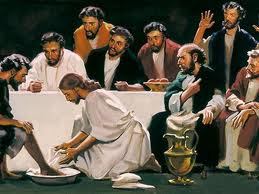
One of the recurring themes in presidential campaigns is that each new candidate promises to be greater and better than the person he wants to replace. Pointing out the failures of the previous office-holder, the new contender guarantees that he won’t make the same mistakes. He will be much greater.
Even in sports the new players carry the ambition of out-performing the “stars” who preceded them in the game. They will be the new record-holders.
We all want to be great. We want to be greater than those who have gone before us. We want to make sure we don’t make the same mistakes our ancestors did.
As we entertain these thoughts of being better than our predecessors we hear Jesus tell his future leaders (see John 13:16-20) these words.
“Amen, amen, I say to you, no slave is greater than his master nor any messenger greater than the one who sent him. If you understand this, blessed are you if you do it.”
I wonder how many egos were suddenly deflated that day when Jesus spoke these words to the Twelve. These were ambitious men who wanted to be famous like Jesus and maybe even outdo him in leadership. Some may have even imagined that they, someday, would be greater than Jesus.
Jesus calls them “slaves;” now this was the lowest rank in their society. It was like telling them they were minimum-wage workers, and that they would never be greater than their supervisor. To illustrate this, Jesus had just taken off his robe, put a towel around his waist, and did the grubbiest work of a lowly servant—he washed the dirty feet of his apostles. Now he was telling them that they were to aspire to this kind of work if they wanted to please him. And so their dreams of “glory” flowed right out of their heads.
Jesus knew that in time, after his passion and death, these men would surrender their pride and become his true servants—all except one.
“I am not speaking of all of you. I know those whom I have chosen. But so that the Scripture might be fulfilled, ‘The one who ate my food has raised his heel against me.’”
Judas thought he was greater than Jesus; after all he held the group’s money and he was able to wield power in the world. He thought he was so great that he could look down upon Jesus and betray him. Judas was imprisoned in his own pride; he would never condescend to be a slave of Jesus.
When we surrender our lives to Jesus, we aspire to imitate him, but not to be greater than He is. Sometimes, in following him, we receive the same kind of treatment he did—we are ignored, we are criticized, we are looked down upon, we are regarded as “nobodies” by the world. Our pride rears its head and we flare up inside, thinking: “I don’t deserve this kind of treatment; after all Jesus Christ, the Son of God, lives in me and works through me!” Then when our emotions subside we see Jesus with a towel around his waist, washing feet, and we remind ourselves of his words, “no servant is greater than his master.”
If in trying to serve with Jesus, I am look down upon as though I am a “nobody,” I remind myself that in God’s eyes I am a “Somebody”…because I’m his child, Jesus lives in me, and my body is a Temple of the Holy Spirit. I will define greatness as God defines it, not as my human ambitions do.
“Behold I am with you always, even to the end of the age” (Matthew 28:20).
